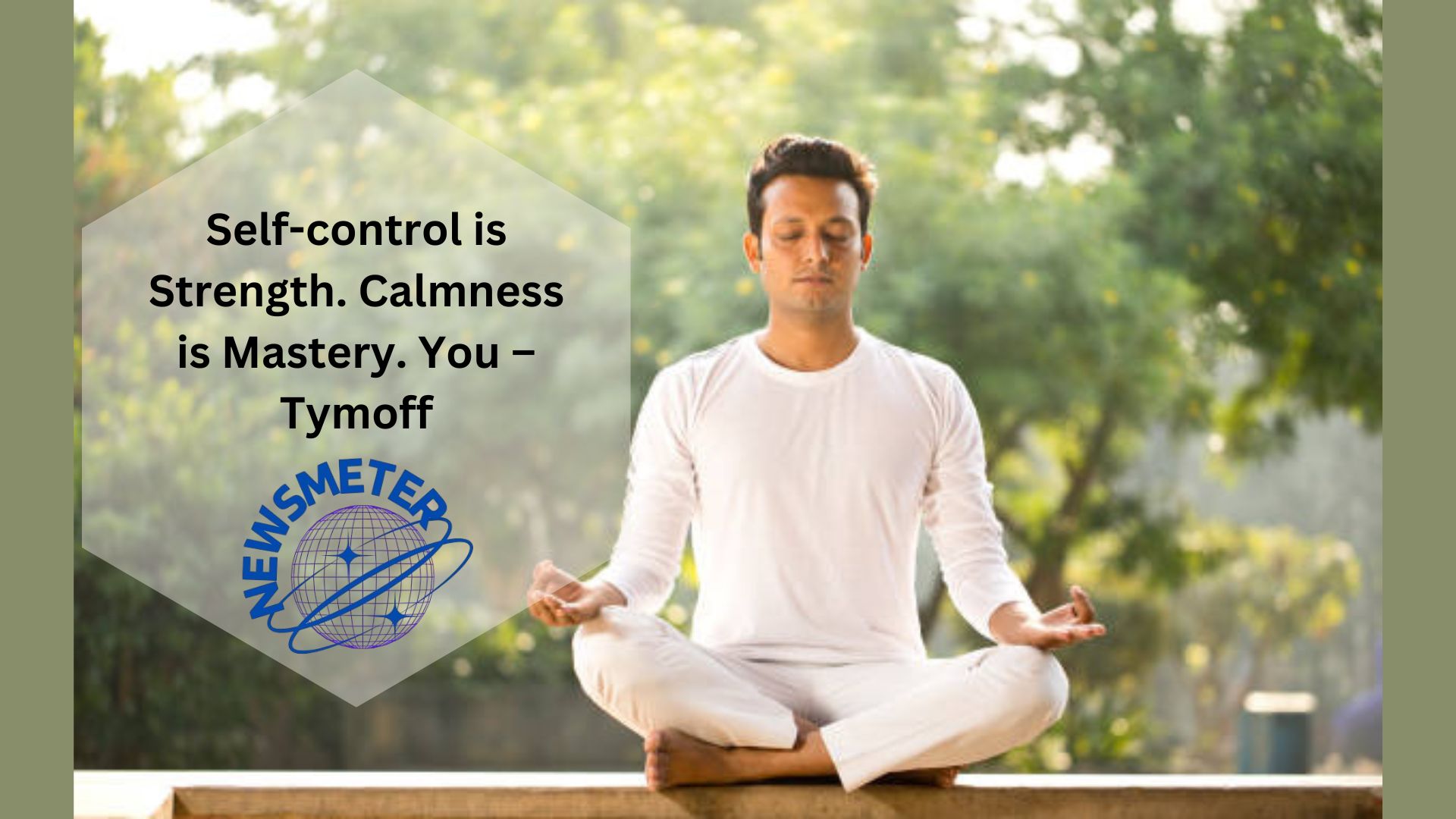Presently, in this fast-paced life and chaotic world, maintaining self-control and staying calm is the key to keep moving. That is what this quote self-control is strength. calmness is mastery. you – tymoff teaches us.
Speaking of it, this quote holds a deep life lesson for every one of us that helps us in our personal growth. Here, in this article, we are explaining the depth of self-control is strength. calmness is mastery. you – tymoff and how it is significant to cultivate these qualities.
Self-Control is Strength. Calmness is Mastery. You – tymoff – tymoff A Deeper Dive
Before diving into the practical applications, it’s essential to unpack the quote and understand its components. So, let’s just break this self-control is strength. calmness is mastery. you – tymoff quote into parts.
Self-Control is Strength
Self-control is often defined as regulating one’s emotions, thoughts, and behaviors in the face of temptations and impulses.
It’s the inner strength that allows us to stay focused on our goals and resist the allure of distractions, negative habits, or harmful behaviors.
When we think of strength, physical prowess might be the first thing that comes to mind. However, true strength transcends the physical.
It’s about the fortitude of the mind and spirit. Self-control is the embodiment of this strength because it requires us to go against our immediate desires for the sake of something greater.
Whether it’s resisting the urge to react in anger, saying no to unhealthy temptations, or staying disciplined in the pursuit of long-term goals, self-control is the bedrock of personal strength.
In a world filled with distractions and instant gratification, self-control is a rare but vital asset. It’s what separates those who achieve their goals from those who are constantly sidetracked. It’s the strength to choose the harder right over the easier wrong.
Calmness is Mastery
Calmness refers to a state of inner peace and tranquility, even in the face of challenges or stress. It’s not about suppressing emotions or being indifferent; rather, it’s about maintaining a balanced and centered state of mind.
Mastery, in this context, is the highest level of skill or expertise one can achieve in managing oneself and life’s circumstances.
Calmness as mastery suggests that those who can remain calm under pressure have mastered not only their emotions but also their life.
This level of calmness doesn’t come naturally to most; it’s a skill that is honed through practice, reflection, and a deep understanding of oneself. Mastery over calmness means you are not easily swayed by external circumstances or inner turmoil.
You have developed a level of emotional intelligence that allows you to respond to situations with clarity and composure rather than react impulsively.
In today’s high-stress environment, where anxiety and stress are rampant, achieving calmness is no small feat.
It is a form of mastery that can transform your life, enabling you to navigate challenges with grace and make decisions from a place of wisdom rather than fear or anger.
The Personal Call: You
The inclusion of “You” in the quote personalizes the message, making it a direct call to action. It’s a reminder that the power to cultivate self-control and calmness lies within each of us. Tymoff’s words are not just abstract concepts but practical advice that we can apply to our daily lives. They challenge us to look inward and take responsibility for our actions, reactions, and overall approach to life.
The Importance of Self-control is strength. Calmness is mastery. you – tymoff
In a society that often glorifies the opposite—impulsiveness, reactivity, and emotional outbursts—the values of self-control and calmness may seem countercultural. Yet, they are more necessary than ever.
Navigating a World of Instant Gratification
We live in an age of instant gratification, where we can fulfill most of our desires with a click of a button. This has made self-control increasingly difficult, as the temptation to indulge in immediate pleasures is ever-present.
Whether it’s binge-watching a series, mindlessly scrolling through social media, or indulging in unhealthy foods, the opportunities to lose control are endless.
However, those who can resist these temptations and stay focused on their long-term goals demonstrate true strength.
They are the ones who achieve success, not because they never feel the pull of temptation but because they have the strength to choose their future self over their present desires.
Managing Stress and Anxiety
Calmness is an antidote to the stress and anxiety that pervade modern life. With the constant barrage of news, the pressures of work, and the challenges of personal life, it’s easy to feel overwhelmed.
When we react to these stressors with panic or anger, we only add to our suffering. However, by cultivating calmness, we can approach these challenges with a clear mind and a steady heart.
Calmness allows us to step back from the chaos and gain perspective. It gives us the space to think critically, make informed decisions, and act with intention.
In a world that often feels out of control, calmness is the mastery that allows us to regain our sense of agency.
Building Resilience
Self-control and calmness are key components of resilience, the ability to bounce back from adversity. Life is full of challenges, setbacks, and unexpected events.
Without self-control, we may find ourselves overwhelmed by these challenges, reacting impulsively and making decisions that only worsen the situation.
On the other hand, calmness allows us to face adversity with courage and composure, turning challenges into opportunities for growth.
Resilience is not about avoiding difficulties but about facing them head-on with the strength and calmness to overcome them. It’s about being able to navigate the storms of life without being thrown off course.
Cultivating Self-Control: Practical Strategies
Now that we’ve explored the importance of self-control let’s look at some practical strategies for developing this crucial quality.
1. Practice Mindfulness
Mindfulness is the practice of staying present and fully engaging with the current moment. It helps you become more aware of your thoughts, emotions, and impulses, giving you the space to choose how you respond rather than reacting automatically.
By practicing mindfulness regularly, you can strengthen your self-control and make more intentional decisions.
Start with simple mindfulness exercises, such as focusing on your breath or paying attention to your surroundings. Over time, you’ll develop greater awareness of your internal state and gain more control over your reactions.
2. Set Clear Goals
Having clear, well-defined goals gives you a sense of direction and purpose. When you’re focused on achieving something meaningful, exercising self-control and avoiding distractions is easier. Break your goals down into smaller, manageable steps, and remind yourself regularly of why these goals are important to you.
Whenever you’re tempted to veer off course, revisit your goals and the reasons behind them. This will help you stay committed to your path and exercise the self-control needed to achieve your objectives.
3. Develop Healthy Habits
Habits are powerful because they automate behavior, reducing the need for constant self-control. By developing healthy habits, you can create a routine that supports your goals and values.
Start by identifying key areas of your life where you need more self-control, such as diet, exercise, or time management, and create habits that align with your desired outcomes.
For example, if you struggle with unhealthy eating, develop the habit of meal planning and preparing nutritious meals in advance.
If you find it difficult to stay focused at work, establish a daily routine that includes time for deep work, breaks, and reflection.
4. Delay Gratification
One of the most effective ways to build self-control is to practice delaying gratification. This involves resisting the temptation of immediate rewards in favor of greater long-term benefits.
The famous “marshmallow test” conducted by psychologist Walter Mischel demonstrated that children who were able to delay gratification by waiting for a second marshmallow tended to have better life outcomes in terms of academic success, health, and overall well-being.
To practice delaying gratification, start with small challenges, such as waiting a few minutes before indulging in a treat or holding off on a purchase until you’ve had time to consider it.
Gradually, you’ll build the strength to resist larger temptations and make decisions that align with your long-term goals.
5. Reflect and Learn
Self-control is a skill that can be developed through reflection and learning. After facing a challenge or temptation, take time to reflect on how you handled it. What worked well? What could you have done differently? Use these insights to improve your self-control in future situations.
Journaling can be a helpful tool for this reflection process. By writing down your experiences, you can gain clarity on your strengths and areas for improvement, setting the stage for continued growth.
Cultivating Calmness: Practical Strategies
Just as with self-control is strength. calmness is mastery. you – tymoff is a skill that can be cultivated with practice. Here are some strategies to help you develop a calm and centered mind.
1. Practice Deep Breathing
Deep breathing is one of the simplest and most effective ways to calm the mind and body. When you’re feeling stressed or anxious, take a few deep breaths, inhaling slowly through your nose and exhaling through your mouth.
This activates the parasympathetic nervous system, which promotes relaxation and reduces stress.
Incorporate deep breathing into your daily routine, whether it’s through a formal meditation practice or simply taking a few moments to breathe deeply throughout the day.
Over time, this practice will help you maintain a sense of calm even in challenging situations.
2. Cultivate Gratitude
Gratitude is a powerful antidote to stress and negativity. By focusing on the positive aspects of your life, you can shift your perspective and reduce feelings of anxiety or frustration.
Start a daily gratitude practice by writing down three things you’re grateful for each day. This simple habit can help you cultivate a more positive and calm outlook on life.
When you’re faced with a stressful situation, try to find something to be grateful for, even if it’s just the opportunity to learn and grow from the experience.
This shift in focus can help you maintain calmness and perspective, allowing you to navigate challenges with a more composed and resilient mindset.
3. Engage in Regular Meditation
Meditation is a powerful tool for cultivating calmness and emotional balance. By setting aside time each day to meditate, you train your mind to let go of distractions and negative thoughts, fostering a state of inner peace.
There are many forms of meditation, including mindfulness, loving-kindness, and transcendental meditation, so you can choose the approach that resonates most with you.
Even just a few minutes of meditation each day can have a profound impact on your ability to remain calm under pressure.
Over time, meditation helps you develop greater awareness of your thoughts and emotions, making it easier to manage stress and maintain a sense of tranquility.
4. Practice Acceptance
Acceptance is the practice of acknowledging and embracing reality as it is without resistance or judgment. When we resist what is happening, we create inner turmoil and stress. However, by accepting things as they are, we can find peace even in difficult situations.
This doesn’t mean passively accepting all circumstances but rather approaching life with a sense of openness and non-attachment.
When you encounter challenges, try to accept them as part of your journey and focus on what you can control rather than what you cannot. This mindset allows you to stay calm and composed, even in the face of adversity.
5. Create a Calm Environment
Your surroundings can have a significant impact on your state of mind. By creating a calm and peaceful environment, you can support your efforts to maintain inner calmness. Consider decluttering your living space, incorporating calming colors and natural elements, and minimizing noise and distractions.
Additionally, spend time in nature whenever possible. Nature has a naturally calming effect on the mind and body, helping to reduce stress and promote a sense of well-being. Whether it’s a walk in the park, a hike in the mountains, or simply sitting by a lake, connecting with nature can help you cultivate calmness and clarity.
The Interconnection of self-control is strength. calmness is mastery. you – tymoff
While self-control and calmness are distinct qualities, they are deeply interconnected and mutually reinforcing. Developing self-control often requires calmness, as a calm mind is better equipped to resist impulses and make thoughtful decisions.
Conversely, practicing self-control can lead to greater calmness, as it helps you manage stress and avoid the turmoil that comes from acting on impulse.
Together, these qualities form a powerful foundation for personal growth and success. When you have the self-control to stay focused on your goals and the calmness to navigate challenges with grace, you are well on your way to mastering your life.
The Journey of Self-Mastery
The path to self-mastery is a lifelong journey. It requires ongoing practice, reflection, and a commitment to personal growth.
Self-control is strength. Calmness is mastery. You – tymoff are not qualities that you simply achieve and then move on from; they are skills that must be continually nurtured and refined.
As you progress on this journey, it’s important to be patient with yourself. There will be times when you falter or give in to impulses, and that’s okay. What matters is that you learn from these experiences and continue to strive for improvement. Self-mastery is not about perfection, but about progress and the willingness to keep growing.
Embracing the Power Within
The quote “self-control is strength. calmness is mastery. you – tymoff is a reminder that the power to shape our lives lies within us. By cultivating self-control and calmness, we unlock the strength and mastery needed to navigate life’s challenges with confidence and grace.
These qualities are not just abstract ideals; they are practical tools that can transform the way we live. Whether it’s in our personal relationships, our work, or our inner lives, self-control and calmness enable us to make better decisions, build stronger connections, and achieve our goals.
As you reflect on this quote and its meaning, consider how you can apply its wisdom to your own life. What steps can you take to strengthen your self-control and cultivate calmness? How can you use these qualities to overcome challenges and move closer to the life you desire?
Conclusion: The self-control is strength. calmness is mastery. you – tymoff
The journey to self-control is strength. calmness is mastery. you – tymoff is deeply personal. It’s about recognizing your own strengths and areas for growth and taking deliberate steps to cultivate the qualities that will help you thrive.
Tymoff’s words serve as both a guide and a challenge, inviting you to embark on this journey with intention and purpose.
Remember, self-control is not about denying yourself; it’s about choosing what’s best for you in the long run.
Calmness is not about avoiding challenges; it’s about facing them with a clear mind and a steady heart. And ultimately, the power to achieve these qualities lies within you.
As you continue on your path, embrace the power of self-control and calmness, and watch as they transform your life.
With these qualities as your foundation, you can navigate the ups and downs of life with strength, mastery, and grace. The journey is yours to take, and the rewards are boundless.
Liked it? Continue to read more at Newsmetre.com where you get to explore the trending news and topics regularly.














